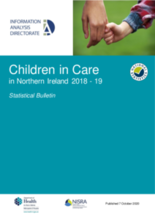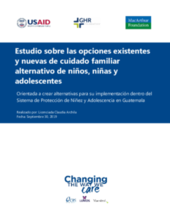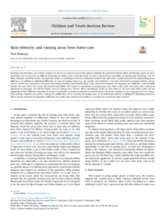Displaying 291 - 300 of 2221
This publication presents the latest figures on children and young people in care in Northern Ireland.
This article documents the author's experiences with the state’s contemporary removal of Aboriginal children in Western Australia (WA) and the practice of Aboriginal Family Led Decision Making (AFLDM), a family led decision making process supported as best practice for Aboriginal families.
Este informe de Changing the Way We Care revisa las opciones existentes de cuidado familiar alternativo en Guatemala y ofrece recomendaciones para otras modalidades y prácticas.
For this study, researchers conducted semi-structured retrospective telephone interviews with foster parents across one southeastern U.S. state to identify local retrospective perspectives on Reasonable and Prudent Parenting Standard (RPPS) implementation.
The current study builds on previous experimental evaluations of the My Life Model (MLM) for self-determination enhancement, which demonstrated effectiveness in improving educational and transition-to-adulthood outcomes for youth in foster care with disabilities, including those with mental health challenges.
Using data from 17 states in the U.S., the author of this study measured the probability of running away from foster care for Black, Hispanic, and White youth.
The aim of this study was to explore the experiences of Victorian foster and kinship carers in accessing health services for children in their care and to quantify the frequency of potential barriers to health care.
Fostering provides a family life for children who are unable to live with their biological parents. The wellbeing of foster carers is important and can have a direct impact on emotional, social and behavioural outcomes for children.
This article presents the results of a qualitative study whose objective was to collect information on the perceptions of changes in parents and their children who are in the Spanish foster care system after completing a positive parenting programme.
This article charts the UK history of contact in fostering and adoption as it relates to looked after children and their birth relatives. It builds on a recent publication in this journal by one of the authors based on her research on the use of social media by children in care.



